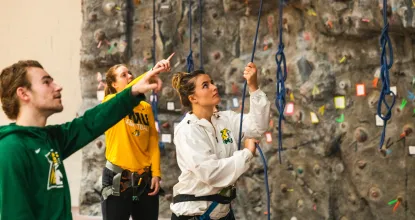
Program Overview
The School of Health and Human Performance offers a CAATE accredited master of science degree in athletic training.
The athletic training master’s degree is offered through a 3 + 2 program that will award the student a bachelor of science (in sports science) degree and a master of science in Athletic Training when completed. These students will meet all pre-admission requirements at NMU and apply to the master’s program during the fall semester of their third year. If accepted, the student will begin the master’s program in the summer between their third and fourth years.
Students wishing to transfer into this program will be evaluated on a case-by-case basis. Students who have already completed a baccalaureate degree either at NMU or at another institution may also apply for admission.
Program Requirements
The 3 + 2 master of science (and undergraduate degree in sports science) degree in athletic training requires the completion of 150-160 credits (includes undergraduate general education requirements, undergraduate credits for sports science, and graduate credits for athletic training). This program is specifically designed to prepare students to sit for the National Board of Certification exam in athletic training and entry into the profession of athletic training.
While it is ideal for students to complete this program through the undergraduate program in sports science, transfer students may also be considered for admission, but may not be able to complete all requirements in 5 years. In addition, students who have already completed a baccalaureate degree at NMU or at another institution, may apply and be considered for admission into the master’s sequence provided they have completed the required pre-requisite courses.
Contact
If you are interested in pursuing a degree in athletic training at NMU, please contact:
Maggy Moore, Ph.D., AT, ATC
Director, Accredited Athletic Training Program
office: 906-227-2228
Mailing address:
School of Health and Human Performance
Northern Michigan University
1401 Presque Isle Avenue
Marquette, Mich. 49855
Fax: 906-227-2181
Program Costs
Students should expect the following costs (estimated & subject to change) while in the AT program:
- Annual TB Test: $10
- Annual Flu Shot: $25
- Immunization updates as needed (Hepatitis B, MMR, Pertussis, Varicella, Tetanus, Diphtheria) – cost will vary depending on need.
- Transportation – students are responsible for their own transportation to and from all clinical placements.
- CPR/FirstAid updates: recertification will be at no cost to the student, however, CPR/FirstAid cards and replacement cards are $3/$17 each, respectively.
- Athletic Training Clothing – Students are required to purchase at least one NMU Athletic Training polo shirt. The estimated cost is $35-$45.
- Students will be assessed a $25 lab fee for ATR 520, 521, and 550. Students will be assessed a $50 lab fee for ATR 541, 542, 591A, 580, 560 and 591B.
- Depending on the students internship site, students may incur additional costs (i.e. drug screen).
Advising
- 2025-2026 Graduate Bulletin
- Recommended Course Map for 3 + 2 Program
- Recommended Course Map for Stand-Alone Master's Program
- Advising Sheet for 3 + 2 Program
- Advising Sheet for Stand-Alone Master's Program (for students who have already completed a Bachelor's degree)
*Student should work closely with their academic advisor(s) to ensure program progress.
For students in 3+2 Program (Sports Science Undergraduate & Athletic Training Masters)
Student Success Advisors:
Sara Kilgas, skilgas@nmu.edu
Juliet Lockwood, julockwo@nmu.edu
Sports Science Advisors:
Dr. Lukus Klawitter - lklawitt@nmu.edu
Dr. Megan Nelson - msuer@nmu.edu
Dr. Isaac Wedig - iwedig@nmu.edu
Dr. Lanae Joubert, ljoubert@nmu.edu
Athletic Training Advisors:
Professor Chris Kirk - ckirk@nmu.edu
Dr. Maggy Moore - mmoore@nmu.edu
Forms
Career Information
To be employed anywhere in the United States as an Athletic Trainer, you must first be certified by the Board of Certification. Following national certification, depending on which state you live in, you may also need to apply for registration and licensure. Currently, interstate regulation of athletic trainers varies.
Where do athletic trainers work?
High Schools
Athletic trainers work in many high schools across the United States. They can be hired directly by the high school, but many are contracted out from nearby sports medicine clinics and hospitals. Additionally, some athletic trainers working in high school settings become certified to teach to augment their career.
Colleges/Universities
Athletic trainers are hired in nearly 100 percent of the colleges and universities across the United States. Job responsibilities vary depending on the individual institution. Some jobs include single-team coverage, while others require teaching physical education, health or athletic training courses in addition to sports team coverage.
Industrial Setting
The newest job setting for athletic trainers is in the industrial setting. Recently, major corporations like GM and Ford Motor Company have begun hiring athletic trainers in these settings to develop rehabilitation/injury prevention programs for ”industrial athletes.”
Sports Medicine Clinics/Hospital Rehabilitation Centers
Athletic trainers, in these settings, may work totally in the clinic/hospital or may be contracted out, some percent of their time, to a local high school, club athletic team or a college/university.
Professional Setting
Athletic trainers work with professional athletic teams, including football, tennis, basketball, hockey, baseball and a variety of other sports.
Refer to these links to learn more about the field of Athletic Training:
- Michigan Athletic Trainers Society
- National Athletic Trainers Association Board of Certification
- Commission on Accreditation of Athletic Training Education
- Great Lakes Athletic Trainers' Association
- Northern Michigan University Student Athletic Training Association
Students wishing to sit for the national certification exam in athletic training (BOC), MUST graduate from a CAATE accredited Athletic Training program.







